Carney’s Liberal Party secures minority government 10:54 AM (6 hours ago)
Mark Carney has secured a fourth term for the Liberals following victory in Canada’s 45th general election on Monday — concluding a campaign period that lasted just over a month.
According to preliminary results from Elections Canada as of 11:45 a.m. CDT, the Liberals are leading in 169 ridings compared to 144 ridings for the Conservatives, with 99.9 per cent of polls reporting.
CTV News has previously projected that the Liberals will form a minority government, just shy of the 172-seat threshold needed for a majority government. Five ridings have been added since the 2021 general election, per a mandatory review of electoral districts every decade.
The Bloc Québécois, NDP and Green Party all lost seats, with the NDP projected to secure 7 seats — down 17 seats from before the election — and out of official party status which requires at least 12 seats in the House of Commons.
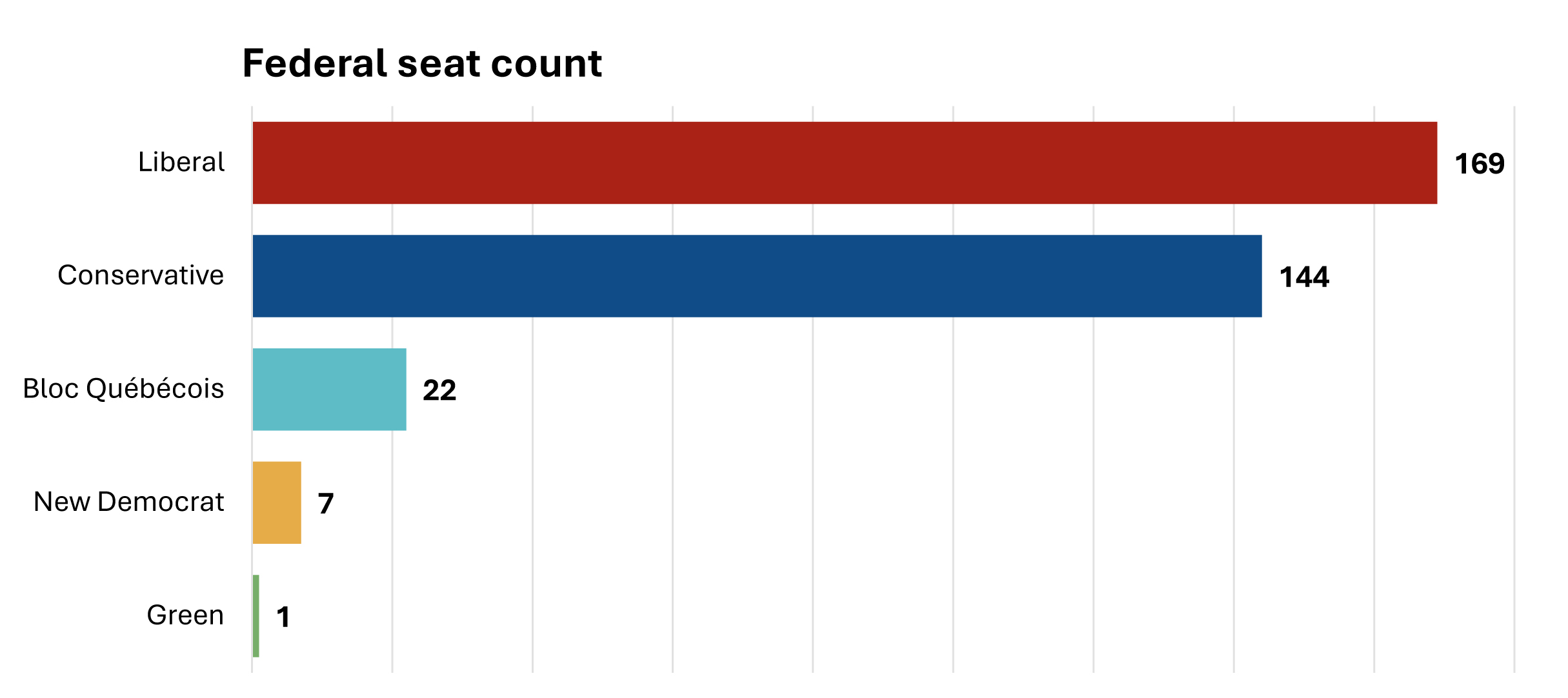
Seat count in the House of Commons following Canada’s 45th general election. Preliminary data from Elections Canada with 99.9 per cent of polls reporting as of May 1 at 12 p.m. CDT. Graph by Milan Lukes
“My government will work for all of you,” Carney announced during his election victory speech.
“We will protect our workers and businesses, and above all, we will build an independent future for our great country. A future that makes the greatest country on earth even better.”
Carney reiterated that Canada is a sovereign nation and stated that “President Trump is trying to break us so that America can own us. That will never ever happen.”
Trump has previously called for Canada to become the 51st state and has referenced former Prime Minister Justin Trudeau at times as “governor” during his time in office.
“I think Canada would be much better off being a 51st state,” Trump told Fox News in an interview that aired in February. Trump stated on social media on election day that Canada would face increased military powers, reduced taxes and zero tariffs if the nation became part of the United States.
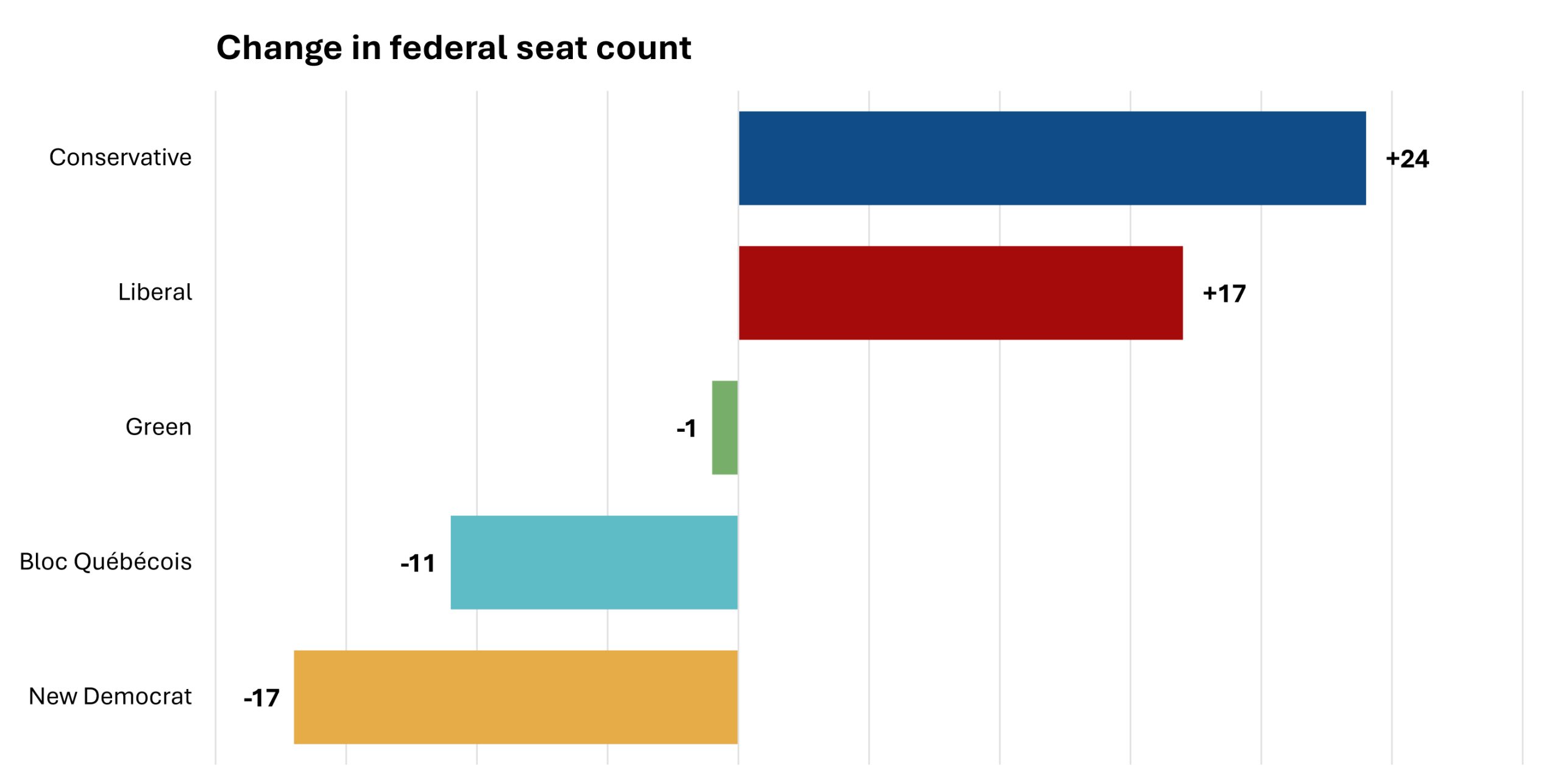
Seat count change in the House of Commons following Canada’s 45th general election. Data from the House of Commons. Graph by Milan Lukes
Poilievre loses his Carleton seat
Carney, who was elected to his first seat in the House of Commons, stated during his victory speech that he also looks forward to working with Bruce Fanjoy — the Liberal candidate who defeated Conservative Party leader Pierre Poilievre in his own riding.
Poilievre has represented his Ottawa-area riding of Carleton since first being elected in 2004, previously winning the riding during the last general election by over 15 per cent. Fanjoy edged out Poilievre by 5 per cent of the votes, according to preliminary results from Elections Canada.
Though the Conservatives failed to capture the most seats, preliminary data indicates that they gained 24 seats — more than the 17 seats picked up by the Liberals.
As of 11:45 a.m. CDT, the Liberals garnered 43.7 per cent of the popular vote compared to 41.3 per cent by the Conservatives, according to Elections Canada. The election denotes the first time since 1930 that two parties have received more than 40 per cent of the vote.
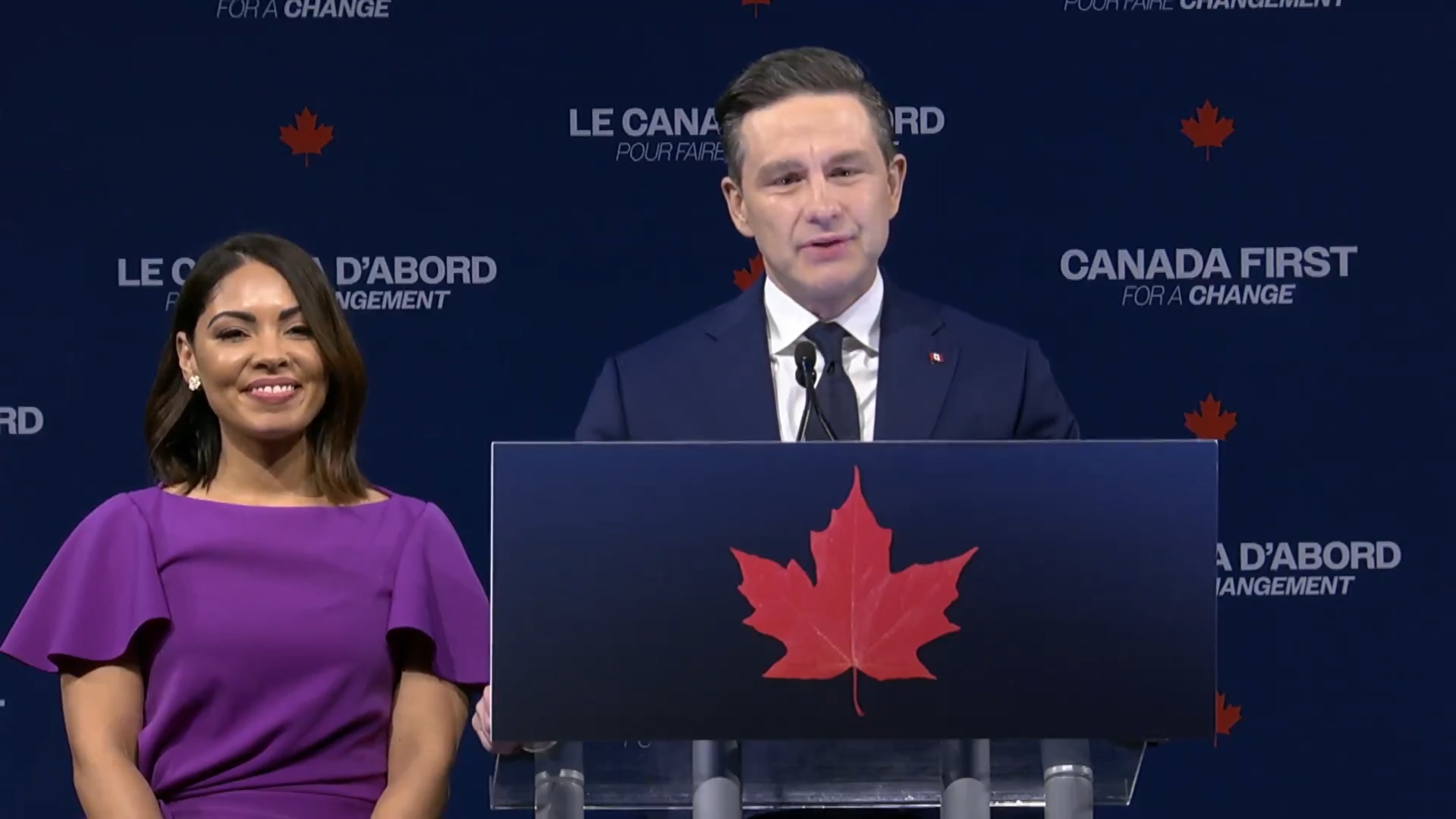
Conservative leader Pierre Poilievre stood next to his wife Anaida Poilievre during his concession speech early on April 29, 2025. Screenshot from x.com/PierrePoilievre
“We are cognizant of the fact that we didn’t quite get over the finish line yet,” said Poilievre during his concession speech, who vied against 90 contenders on the ballot for his seat.
“We know that change is needed, but change is hard to come by. It takes time. It takes work. And that’s why we have to learn the lessons of tonight so that we can have an even better result the next time the Canadians decide the future for the country.”
Under law, the leader of the Official Opposition must be held a sitting MP, though that is not a requirement to serve as leader of the Conservative Party.
“I will never give up on fighting for everyone who stood with us today and the millions of people who voted for other parties,” he said.
Singh steps down as leader after losing his own seat
Jagmeet Singh, leader of the NDP, was also unable to win his seat — running for re-election in Burnaby Central in B.C. and coming in third place to Liberal candidate Wade Chang.
“I’ll be stepping down as party leader as soon as an interim leader can be appointed,” he announced during his concession speech. Singh was elected as leader on the first-round ballot in 2017.
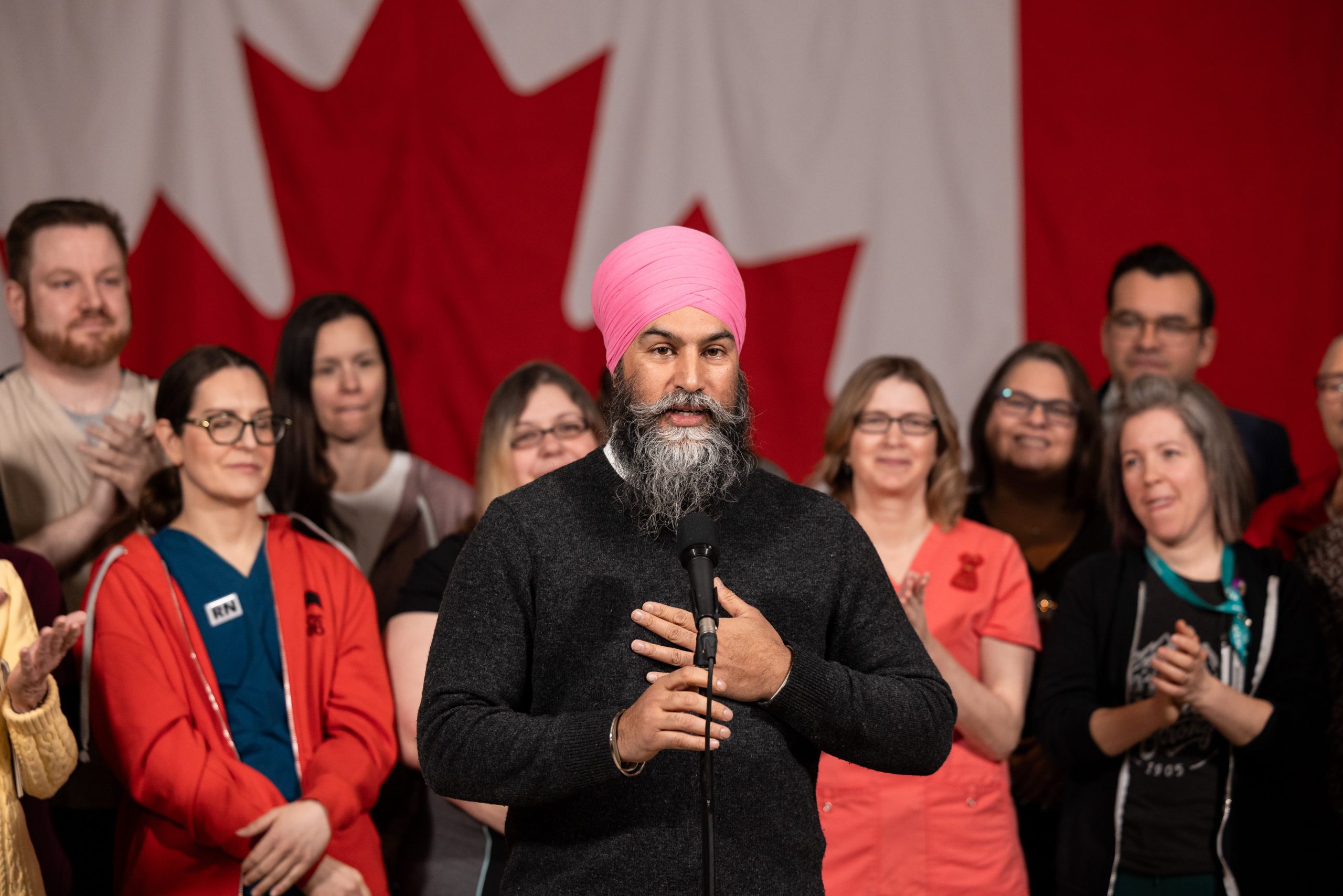
NDP leader Jagmeet Singh announced that he will resign as party leader. Singh finished third in his own riding with the NDP losing official party status. Photo from x.com/theJagmeetSingh posted on April 26, 2025
“I know this night is a disappointing night for New Democrats. We had really good candidates that lost tonight,” he stated.
Since being founded in 1961, the last time the NDP lost official party status in the House of Commons was after the 1993 election under Audrey McLaughlin, where the party only secured 9 seats and 6.9 per cent of the vote.
Without official party status, the NDP would receive less in parliamentary budget funding, lose the ability to sit on committees and have fewer opportunities to speak during question period.
The NDP previously formed the Official Opposition from 2011 to 2015 under Jack Layton, winning an all-time high 103 ridings.
Liberals gain two seats in Manitoba, Conservatives gain one
Three ridings in Manitoba have flipped from the previous election, with the Liberals gaining two seats and the Conservatives gaining one.
Liberal candidate Doug Eyolfson unseated incumbent Conservative Marty Morantz in Winnipeg West, previously known as Charleswood—St. James—Assiniboia—Headingley before the riding redistribution.
Eyolfson, who previously served as an MP for the riding from 2015-19, defeated Morantz with nearly 14 per cent more votes. Eyolfson tried to regain his seat in the past two general elections, losing to Morantz by 1 per cent in 2021.
NDP incumbent Niki Ashton was also defeated in Churchill—Keewatinook Aski, a riding that she has represented since 2008, losing to Liberal candidate Rebecca Chartrand.
The NDP lost a second seat in Manitoba following the defeat of Leila Dance in Elmwood—Transcona to Conservative candidate Colin Reynolds. Dance previously defeated Reynolds in a September 2024 by-election after the resignation of Daniel Blaikie, who held the riding for the NDP since 2015.
Overall, the Conservative seat count in Manitoba remains unchanged at 7 seats, with the gain of Elmwood-Transcona by Reynolds making up for the loss in Winnipeg West.
The Liberals now maintain 6 seats — an increase of 2 seats from the previous election — with the NDP down to a lone seat in the province. NDP incumbent Leah Gazan was re-elected in Winnipeg Centre, defeating the Liberal runner-up by over 4 percentage points.
National voter turnout amounted to 68.7 per cent of registered electors, according to Elections Canada, which does not include electors who registered on election day. The last time voter turnout surpassed that number was in 1993, per historical data from Elections Canada.
The post Carney’s Liberal Party secures minority government appeared first on The Manitoban.
Presentation slide from UMSU VP deemed ‘offensive’ and removed from meeting minutes 27 Apr 10:28 PM (3 days ago)
A slide presented by University of Manitoba Students’ Union (UMSU) vice-president external affairs Prabhnoor Singh at the April 10 UMSU board meeting has been removed from the meeting minutes following complaints of “offensive” content.
The slide described the religious concept of “seva” in Sikhi which entails “selfless service” and was presented as part of the UMSU executive’s stance opposing honoraria for community representatives.
Singh, who receives a salary and benefits totaling over $40,000 as one of UMSU’s executives, presented the slide before a motion was set to be introduced which called for community representatives to receive a $500 honorarium.
The motion for community representative honoraria, entitled “Fairness for Community Reps,” needed to be seconded from an UMSU director to proceed to a committee for review.
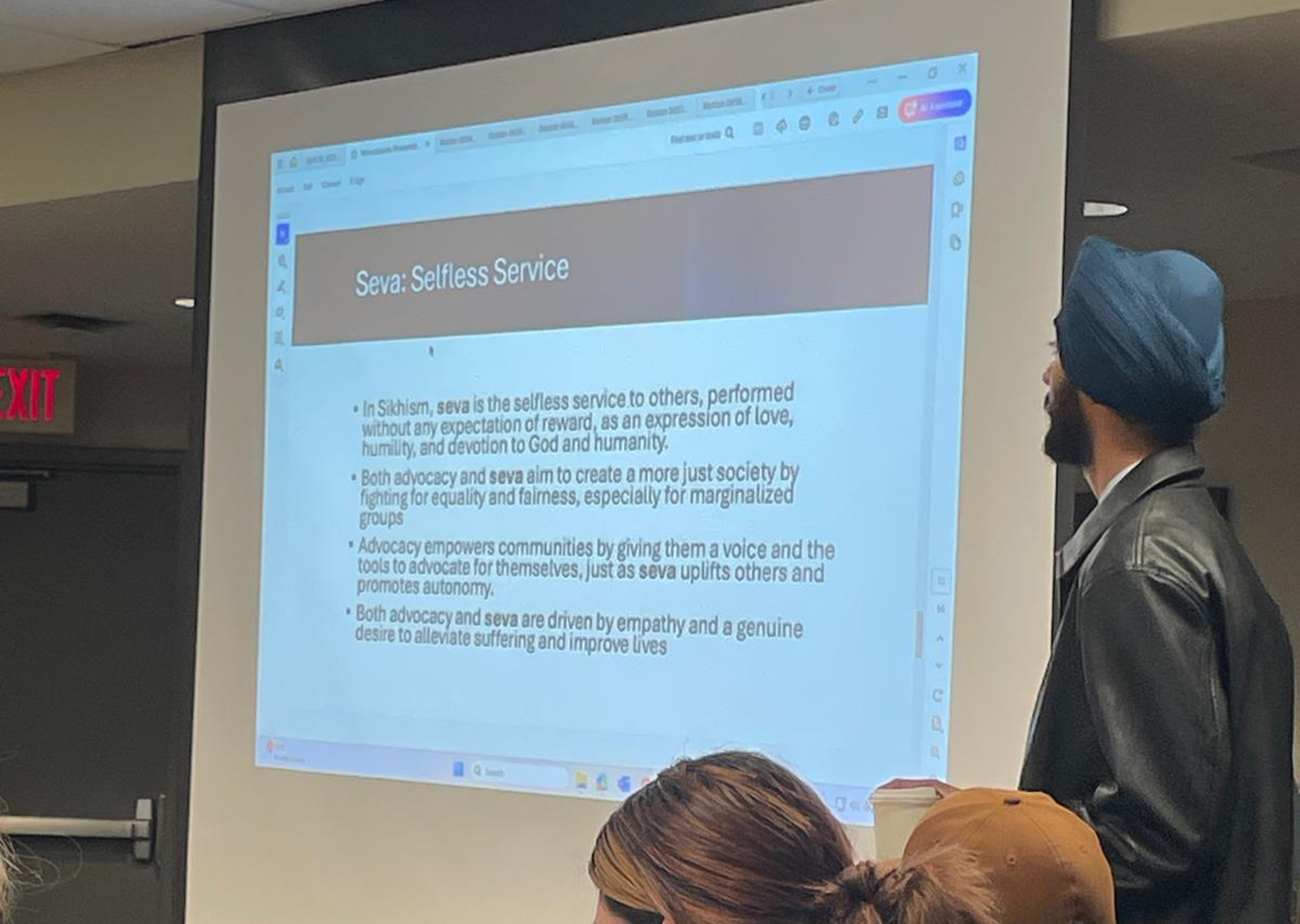
Prabhnoor Singh presented a slide at the April 10 UMSU board meeting on the concept of seva (selfless service) as part of the rationale why community representatives should not receive honoraria. The slide was presented moments before a motion for UMSU community representative honoraria was set to be tabled which required a seconder. Photo by Milan Lukes
Community representatives are elected in UMSU’s general election to represent marginalized communities of the student body and serve without a salary.
“In Sikhism, the religion that I practice, there’s a big concept of seva,” said Singh, who is also the UMSU president-elect, while presenting the slide.
“Seva is the selfless service to others, performed without any expectation of reward, as an expression of love, humility and devotion to God and humanity,” states the slide.
“Both advocacy and seva are driven by empathy and a genuine desire to alleviate suffering and improve lives,” said Singh.
Interim UMSU board chairperson Christopher Yendt stated at the April 24 UMSU board meeting that he “received confidential complaints from members of that community” that found the slide “offensive” and recommended that it be removed from circulation.
“I conferred with the presenter of the presentation, who kindly agreed also that it be removed from public circulation,” stated Yendt.
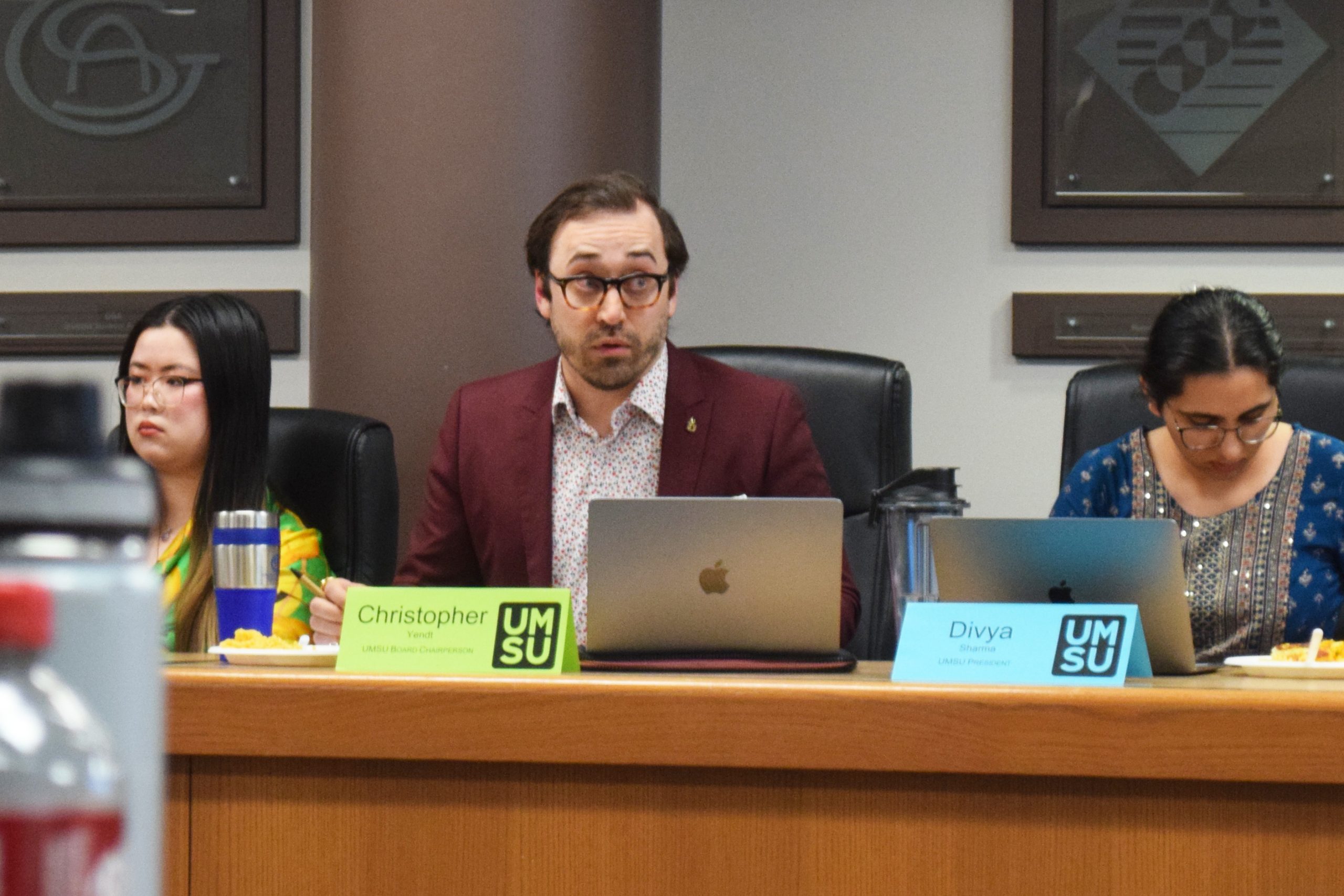
Interim UMSU board chairperson Christopher Yendt (centre) stated that he received complaints which called the presentation slide offensive. Photo by Milan Lukes
Singh did not respond to the Manitoban’s request for comment by the publication deadline.
UMSikhSA speaks out against the presentation slide
In a statement from the University of Manitoba Sikh Students’ Association (UMSikhSA) to the Manitoban, the UMSikhSA executive team denounced the slide and expressed appreciation for the decision to omit the slide from the meeting minutes.
“The politicization of our faith to influence the board’s decision not only undermines the rights and contributions of community representatives, but also distorts and omits essential principles of Sikhi,” reads the statement in-part.
“Sikh teachings emphasize that governance should be guided by compassion and a commitment to ensuring equal opportunity for all individuals.”
UMSikhSA received concerns from community members regarding the recent presentation, according to the statement.
“Sikhs do not proselytize and fundamentally reject the imposition of their beliefs on others. Sikh values strongly discourage any form of compulsion in spiritual practice, including in seva,” reads the statement.
The executive team of UMSikhSA, an UMSU-recognized faith group representing Sikhs on campus, stated that “we respectfully request to be included in any dialogue concerning our faith prior to its use or representation by UMSU in any capacity.”
The statement said that the group “is encouraged by the growing presence of Sikh students in leadership roles and we recognize that mistakes are part of growth.”
Racialized students’ representative Christabel Attoni-Oteari stated during the April 24 UMSU board meeting that the presentation on the executive’s honoraria stance “really felt demeaning.”
“And I know a lot of the other reps also share that same feeling because it made it as though the work that we do is not as much as it is,” she said.
The motion for community representative honoraria was ruled out of order at the April 24 UMSU board meeting for breaching UMSU’s bylaws. UMSU president Divya Sharma later announced that community representatives would receive a $250 UMSU gift card.
The post Presentation slide from UMSU VP deemed ‘offensive’ and removed from meeting minutes appeared first on The Manitoban.
UMSU community rep honoraria motion ruled out of order 27 Apr 4:13 PM (4 days ago)
A motion for the University of Manitoba Students’ Union (UMSU) community representatives to receive a $500 honorarium was ruled out of order at the April 24 UMSU board of directors meeting.
The motion was previously put forward at the April 10 UMSU board meeting by student-at-large Victoria Romero and referred to finance committee for review.
Interim board chairperson Christopher Yendt ruled that the motion violated a clause in UMSU’s bylaws which states that “appointees to a governing body shall not be entitled to any remuneration” with an exception “for seats of a governing body assigned to the appointee to a position of title or to an UMSU employee where explicitly allowed in these bylaws.”
The chair’s decision was appealed by Andrew Beck, Interdisciplinary Health Program Students’ Association representative “for the sake of conversation,” but was sustained by the board of directors.
It was revealed during conversation that another clause in UMSU’s bylaws states that “appointees to director positions shall receive no remuneration.”
“[This] only adds credence to the original argument,” stated Yendt.
Despite both clauses appearing in UMSU’s bylaws dating back to at least April 2018, 2SLGBTQIA+ students’ representative Theodore Biggs-Engel previously claimed that community representatives received honoraria for at least the past two years.
“What it appears to me now is that there has been unequal enforcement of the rules from last year into this,” stated incoming vice-president external affairs Jared Ramos Murphy to board members.
Ramos Murphy questioned the possibility to “correct [the bylaws] now,” with Yendt stating that since “the board is the one that approves the [bylaws] document, the board can break the [bylaws] document.”
Yendt added that “the implication of that is pretty seismic, because you have a very set-out process by which you revise and approve and change the bylaws.”
No changes were ultimately made to UMSU’s bylaws during the meeting.
Though the honoria motion was ruled out of order, vice-president finance and operations Carolyn Wang stated that “the conclusion that a lot of the finance committee members came up to is that they didn’t really have enough performance indicators to make the decision.”
Wang noted that “possible solutions” were discussed for community representative honoraria in the future, “such as written reports that finance committee can access, measurable [key performance indicators] and possible bylaw amendments.”
It’s about feeling appreciated, say community representatives
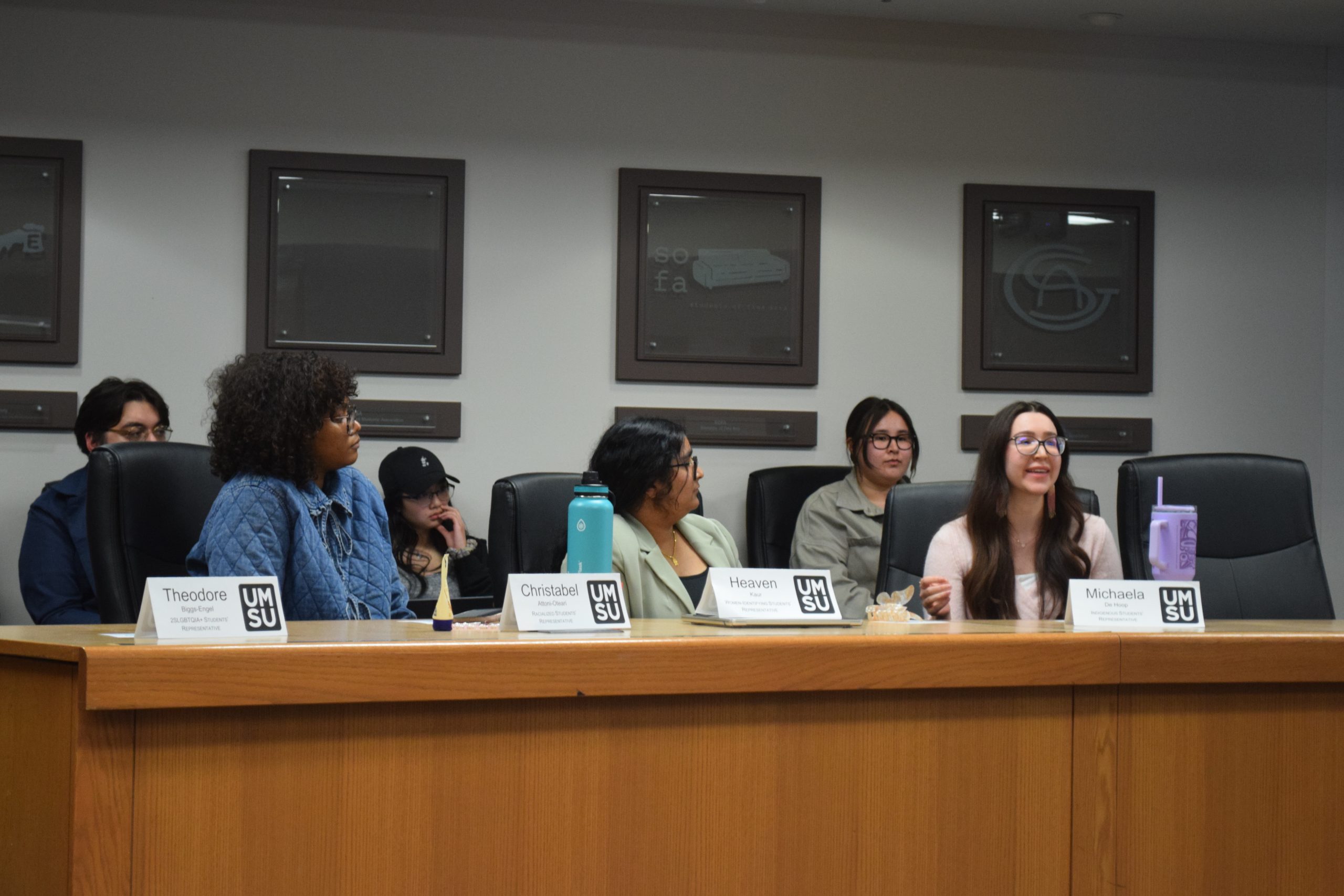
Racialized students’ representative Christabel Attoni-Oteari (left), Women’s Centre representative Heaven Kaur and Indigenous students’ representative Michaela de Hoop (right) were amongst the community representatives that spoke of the hardships they experienced during the year in their positions. Photo by Milan Lukes
During an open discussion on the out-of-order motion, multiple community representatives noted that the sentiment of feeling appreciated was valued more than the amount of the honorarium.
“It’s a little frustrating this year to put in the work that we put in, not get any support and then not get any appreciation at the end,” said Christabel Attoni-Oteari, racialized students’ representative.
“It’s not about the money amount, it’s about the appreciation,” she said. “I just wanted to feel appreciated.”
Attoni-Oteari described a year “filled with a lack of support from [the] executive team,” claiming that every issue brought forward was either tabled for later executives to deal with “or straight-up ignored.”
She referenced issues such as trying to get a community representative coordinator, a float for financing events and a larger Racial Equity and Inclusion Alliance office.
Attoni-Oteari added that she had zero conversations this year with some UMSU executives, claiming that some have “not even tried at all” to engage in discussions.
“If I was to get an honorarium, my plan was to use part of that money to pay the rest of my community members, because they put in a lot of work,” she said.
Michaela de Hoop, Indigenous students’ representative, stated that she always bought her executive team coffees “because I know what it’s like to not be valued.”
“I took on my role to connect with my community, but it truly isolated me more from it, because I became this big, bad villain of UMSU to them,” she said.
“They just saw me as this bureaucratic entity,” she added, noting that she had to lay down the rules.
“And they stopped seeing me as a member of the community supporting each other, and it was really, really hard.”
Gurpahul Kaur, Arts Student Body Council UMSU director, stated that she had nothing to say against the chair’s ruling on the motion “because it made sense, if the bylaws say it, the bylaws say it,” but added that honoraria “should have been done.”
“For any future community reps, I will do everything in my power to ensure that your work is recognized, whether that be through an honorarium,” stated Ramos Murphy.
Sharma announces $250 gift cards for community representatives
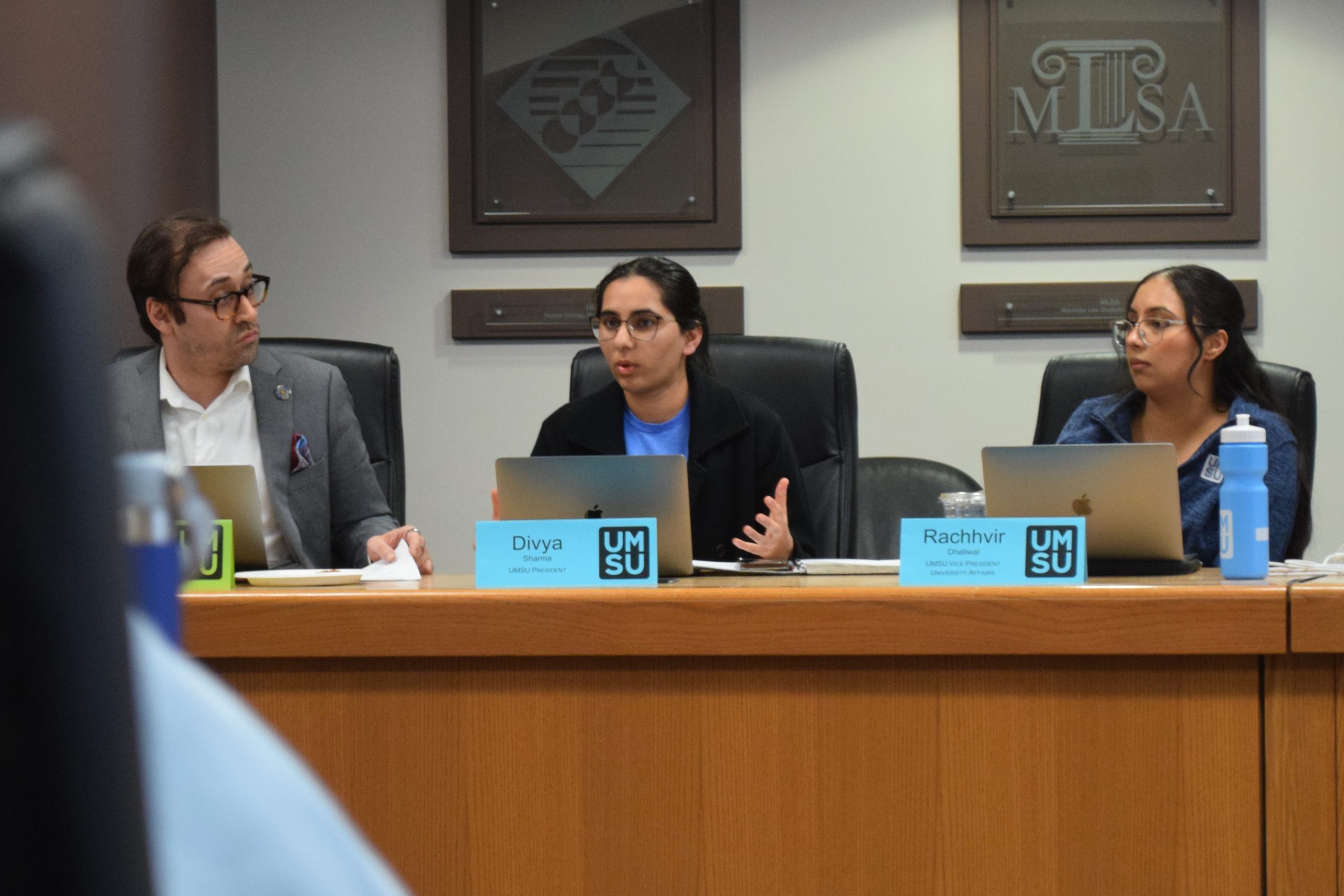
Directly after a special board meeting held the following day, UMSU president Divya Sharma (centre) announced that community representatives would receive a $250 UMSU gift card “along with a special note.” File photo from March 27 by Milan Lukes
The following day, UMSU president Divya Sharma announced on behalf of the executive committee that community representatives would each receive a $250 UMSU gift card “along with a special note” after “a lot of reflecting.”
“We recognize all the hard work that you’ve done,” said Sharma.
“We appreciate the countless hours that you have put in and more than that, we also appreciate your willingness to be open with us yesterday.”
Sharma made the remarks directly after a special UMSU board meeting that was held to reveal the findings of an investigation into the international students’ representative. The accusations laid out in a previous motion were deemed to be unsubstantiated by an ad-hoc committee.
“We had a very robust discussion in terms of the board remuneration process,” said Sharma, who noted that it is the finance committee’s decision — not the executive committee’s decision — to provide honoraria.
“We understand a lot of the burdens that come with holding office,” she said, adding that “it takes a lot of courage to be able to share some of your experiences.”
The post UMSU community rep honoraria motion ruled out of order appeared first on The Manitoban.
UMSU executives take oath of office 25 Apr 12:12 AM (6 days ago)
Members of the 2025-26 University of Manitoba Students’ Union (UMSU) executive took the oath of office at the April 24 UMSU board of directors meeting — the final regularly scheduled meeting of the year.
Christopher Yendt, interim board chairperson, administered the oaths individually at the front of the UMSU Council Chambers.
The five executive members each took oath to “diligently, faithfully and to the best of [their] ability, fulfill the duties, responsibilities and expectations” of their respective positions.
The executives vowed to act “in the best interest of the students that belong to the union” and committed to “not violate the trust” bestowed on them.
The newly sworn-in executive members will officially start their terms in office on Thursday, May 1.
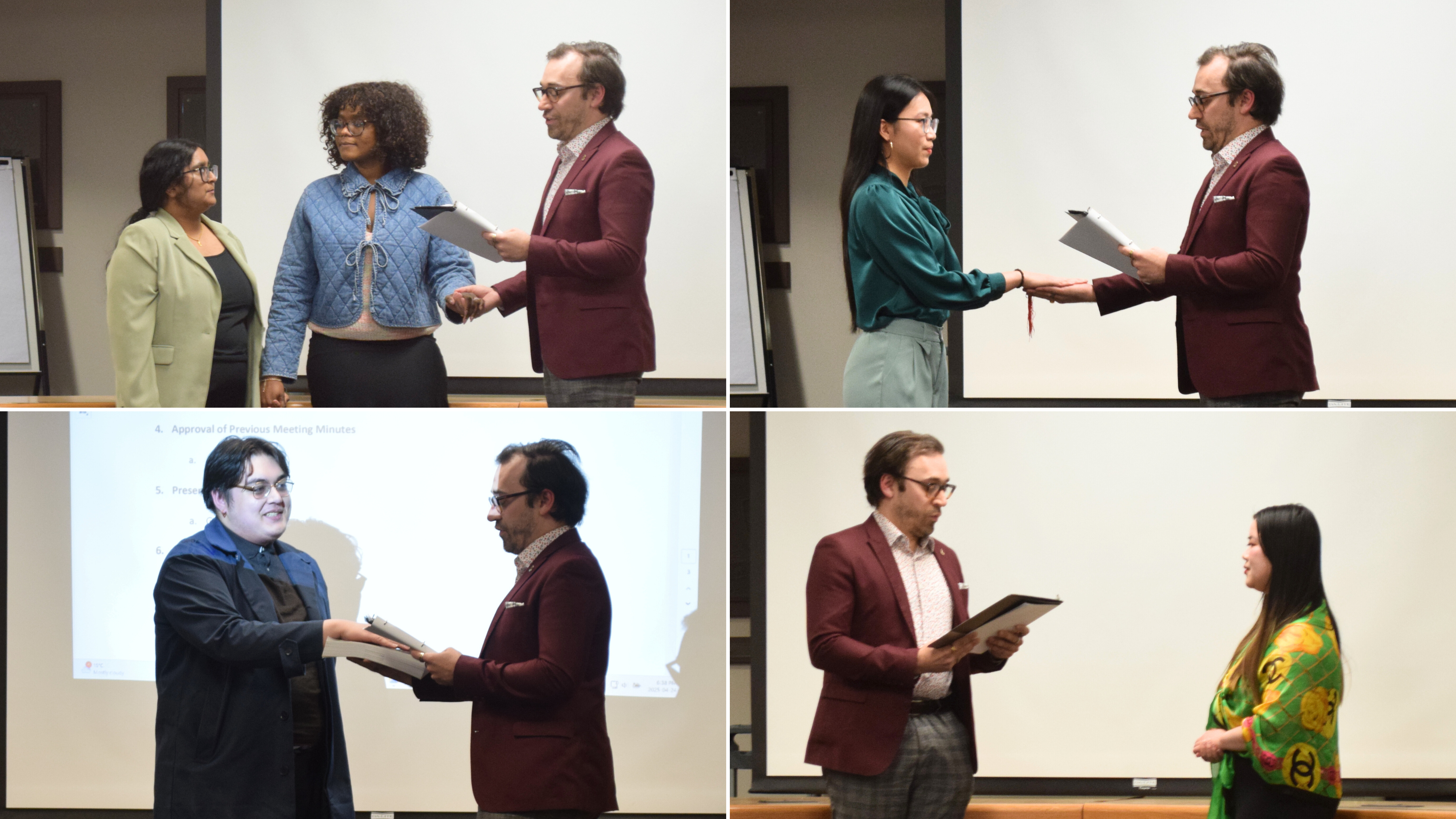
The four incoming UMSU vice-presidents took the oath of office at the April 24 UMSU board meeting. Top row, left to right: Heaven Kaur (leftmost) and Hannah Le. Bottom row, left to right: Jared Ramos Murphy and Carolyn Wang. Photos by Milan Lukes
The 2025-26 executive will consist of Prabhnoor Singh as president, Heaven Kaur as vice-president university affairs, Jared Ramos Murphy as vice-president external affairs, Hannah Le as vice-president student life and Carolyn Wang as vice-president finance and operations.
Both Singh and Wang have served as UMSU executives during the 2024-25 year.
The UMSU president and vice-presidents must take the oath of office, per the UMSU Governance and Operations Manual.
“Failure to do so shall preclude the president and/or vice-presidents from carrying out their duties as prescribed by the [University of Manitoba Students’ Union Act] and the bylaws of the union.”
Though UMSU’s governing documents do not require executives to swear an oath of office on any item, certain executives chose to follow the custom — such as Ramos Murphy opting to swear on a law school admission test book.
Thank you for ‘stepping up to the challenge,’ says Sharma
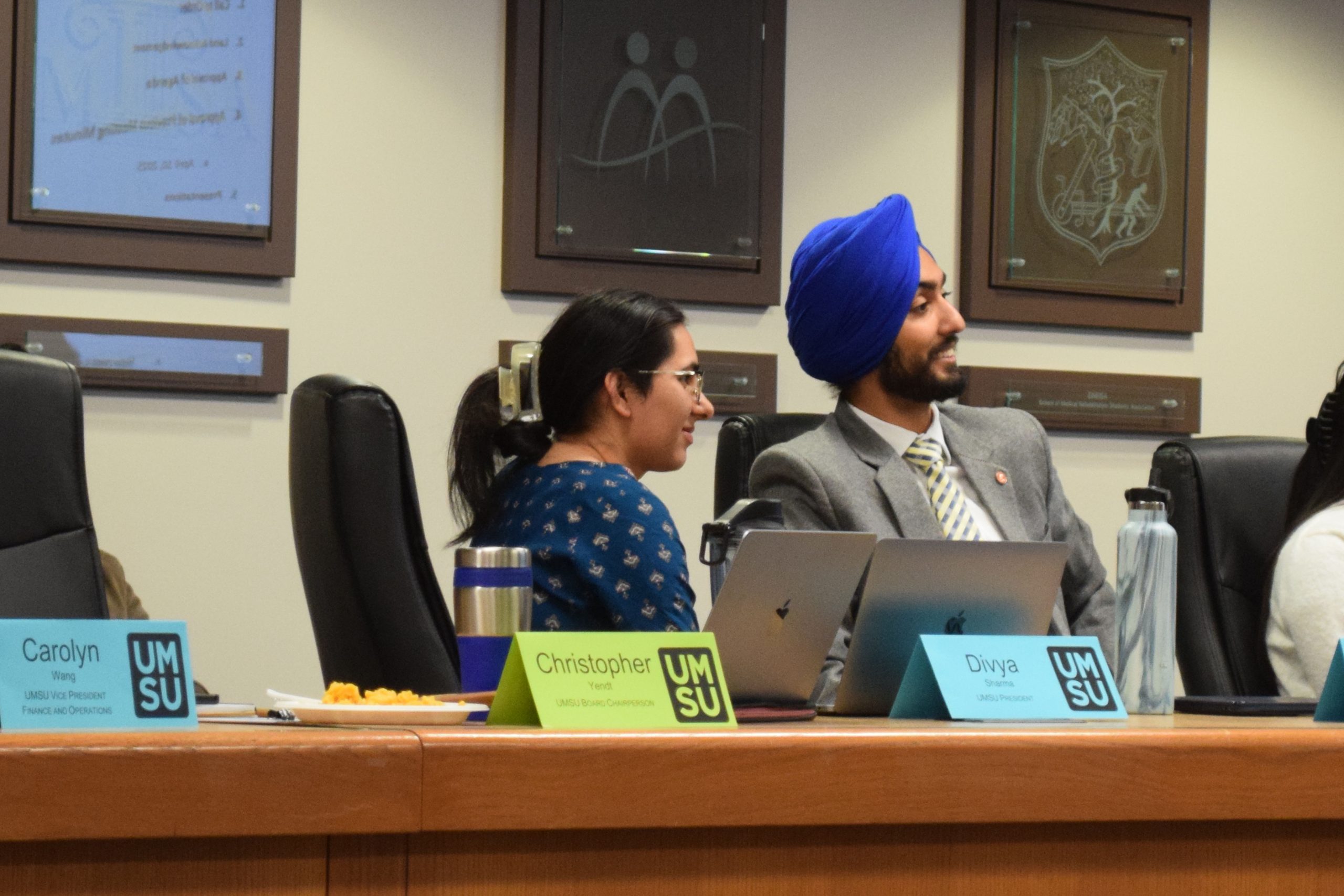
UMSU president Divya Sharma (left) watches the vice-president inaugurations alongside incoming president Prabhnoor Singh. Photo by Milan Lukes
In her final board report as UMSU president, Divya Sharma thanked all board of directors for their service and for “stepping up to the challenge.”
“Obviously, this is a very big commitment and over the last couple of weeks and months, we’ve had meetings upon meetings — sometimes emergency meetings, sometimes meeting virtually,” she said.
“I know we’ve had several agreements, disagreements, heated moments, all these different things, but I think that’s made each and every [one] of us a better board member, a better human being and a better student leader.”
Sharma individually acknowledged the work of committee chairs, interim board chairperson Christopher Yendt, UMSU policy and strategy advisor Sophie George and UMSU general manager Thomas Blumer.
She also gave special thanks to the 2024-25 executive members, stating “I wouldn’t be the type of president I am without every single one of them.”
The post UMSU executives take oath of office appeared first on The Manitoban.
Record 7.3M Canadians voted in advance polls 24 Apr 8:54 PM (6 days ago)
An estimated 7.3 million Canadians have cast their ballot in the federal election during the four-day advance voting period — setting a record turnout, according to Elections Canada.
The preliminary figure indicates a 25 per cent increase from the 5.8 million people who voted in the advance polls in the 2021 general election.
Advance polls were open from Friday, April 18 to Monday, April 21.
An estimated two million votes were cast on the first day of advance voting, setting a single-day record turnout per Elections Canada.
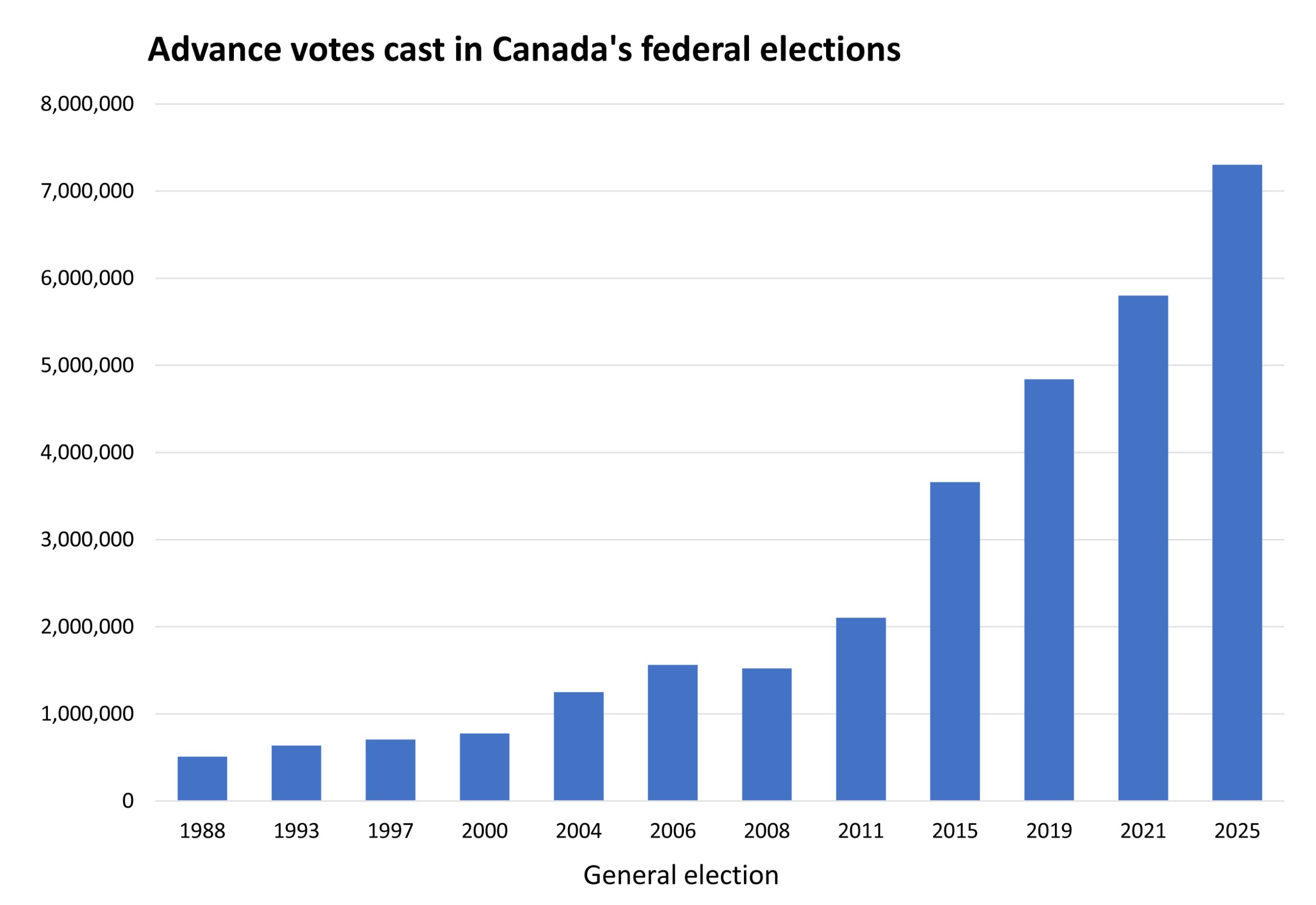
Historical data from Elections Canada on votes cast during advance polls dating back to the 1988 general election. Graph by Milan Lukes
Data also reveals that 1,772 votes were cast from Manitoba post-secondary campuses as part of Elections Canada’s Vote on Campus initiative, which ran from April 13 to 16.
Canadian citizens were able to cast their ballot during this time at the U of M, University of Winnipeg, Red River College and University College of the North — in addition to over a hundred other voting locations on campuses across other provinces and in the Yukon.
In total, 75,471 votes were cast as part of the Vote on Campus initiative.

Voting took place at the U of M Fort Garry campus in UMSU University Centre from April 13-16. The initiative was part of Election Canada’s cross-country Vote on Campus program. Photo by Milan Lukes
Christopher Adams, an adjunct professor in political studies at the U of M, stated that multiple factors may have caused the record turnout at the advance polls.
“I think there are people on both sides of the Conservatives and the Liberals who have strong feelings about their preferences,” said Adams, noting that support may have been “less strong” when Erin O’Toole was leader of the Conservatives and when Justin Trudeau was looking for another election victory.
Adams referenced the large rallies hosted by Pierre Poilievre, leader of the Conservatives, as well as Mark Carney’s decisive victory with over 85 per cent of the first-preference vote during the Liberal Party leadership race.
“I think this time around, there’s more concrete support for the choices being made,” he stated.
Adams also stated that “Trump has really mobilized Canadians” with his comments about different leaders and on Canada’s sovereignty.
He added that having advance voting on the Easter holiday may have also caused a higher voter turnout, noting that a lot of people are not working on Good Friday and may have more time.
Adams claimed that advance voting used to be “seen as an unusual thing,” typically when people were not around for election day, but stated that “now it’s seen as a very normal thing for people to be doing.”
According to a spokesperson for Elections Canada, over 940,000 people in Manitoba are registered electors, with approximately 256,900 having already cast their vote in advance.
Canada’s 45th general election will be held on April 28.
The post Record 7.3M Canadians voted in advance polls appeared first on The Manitoban.
Motion for UMSU community representative honoraria referred to finance committee 23 Apr 3:07 PM (8 days ago)
A motion calling for the University of Manitoba Students’ Union (UMSU) community representatives to receive a $500 honorarium upon completion of their terms has been referred to finance committee for review — moments after members of the UMSU executive voiced their opposition.
The motion entitled “Fairness for Community Reps” was submitted by student-at-large Victoria Romero at the April 10 UMSU board meeting and was seconded by Andrew Beck, Interdisciplinary Health Program Students’ Association representative.
UMSU currently has seven community representatives who are to “advocate on behalf of, and represent their community at the UMSU board of directors in the best interest of their community,” amongst other tasks, according to the UMSU Governance and Operations Manual.
Community representatives are elected and serve without a salary, with each community group receiving a dedicated room on campus and up to $16,000 for events and initiatives that benefits the community.
UMSU executives in opposition of community representative honoraria
Directly before the motion was introduced, vice-president student life Bolu Akindele and vice-president external affairs Prabhnoor Singh presented what he called the “UMSU exec stance” on community representative honoraria.
Singh claimed that providing honoraria “could compromise the integrity of the board,” adding that it could lead to a “narrow self-serving agenda” amongst the community representatives.
“Paying voting members could lead to biases in decision making and paying members might vote based on what benefits them financially or personally, rather than what’s for the best interest of their community or the organization as a whole,” he stated.
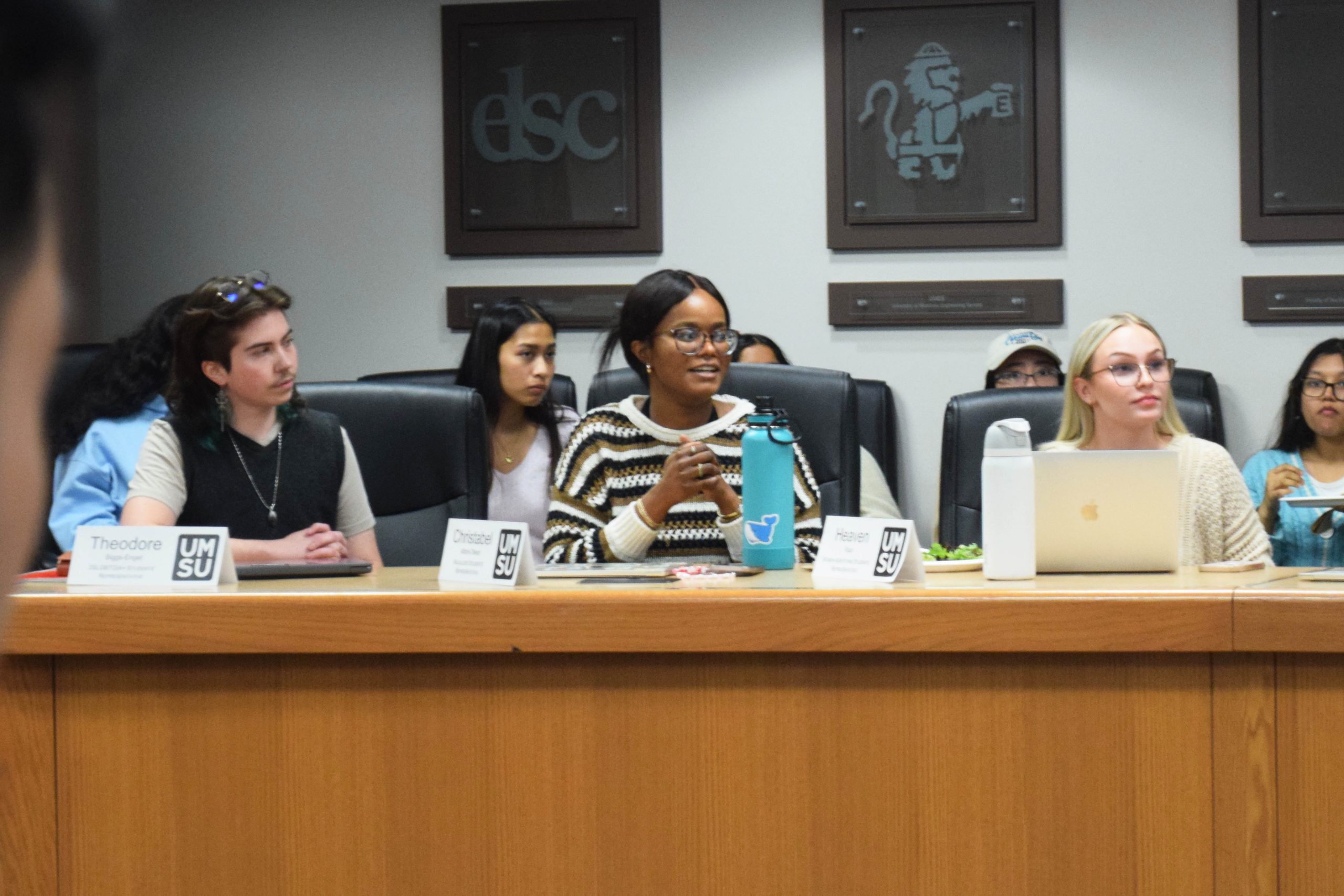
2SLGBTQIA+ students’ representative Theodore Biggs-Engel (left), racialized students’ representative Christabel Attoni-Oteari and Women’s Centre representative-elect Leata Goulet (right) were amongst the students that asked questions following the presentation from Singh and Akindele. Photo by Milan Lukes
Singh said that UMSU executives and the general manager do not receive a vote on the UMSU board of directors because they receive salaries.
UMSU president Divya Sharma acknowledged that community representatives have received financial compensation in the past, but claimed that they have not always had voting rights at board meetings.
“We recognize that there are legal risks to doing this,” she stated.
In an email statement to the Manitoban, Theodore Biggs-Engel, 2SLGBTQIA+ students’ representative, claimed that community representatives received honoraria for the past two years while still holding voting rights.
Lack of structure to assess honoraria, says Singh
Singh also stated that there is a “lack of structure to assess honorariums,” which makes it “impossible to assess contributions and decide who should receive what amount with honorariums.”
He claimed that this was a major reason why last year’s finance committee opted to not proceed with community representative honoraria this year.
“Determining how much honorarium each individual person should receive can be highly complex,” said Singh.
“Without clear performance metrics, there is no fair way to justify honorariums.”
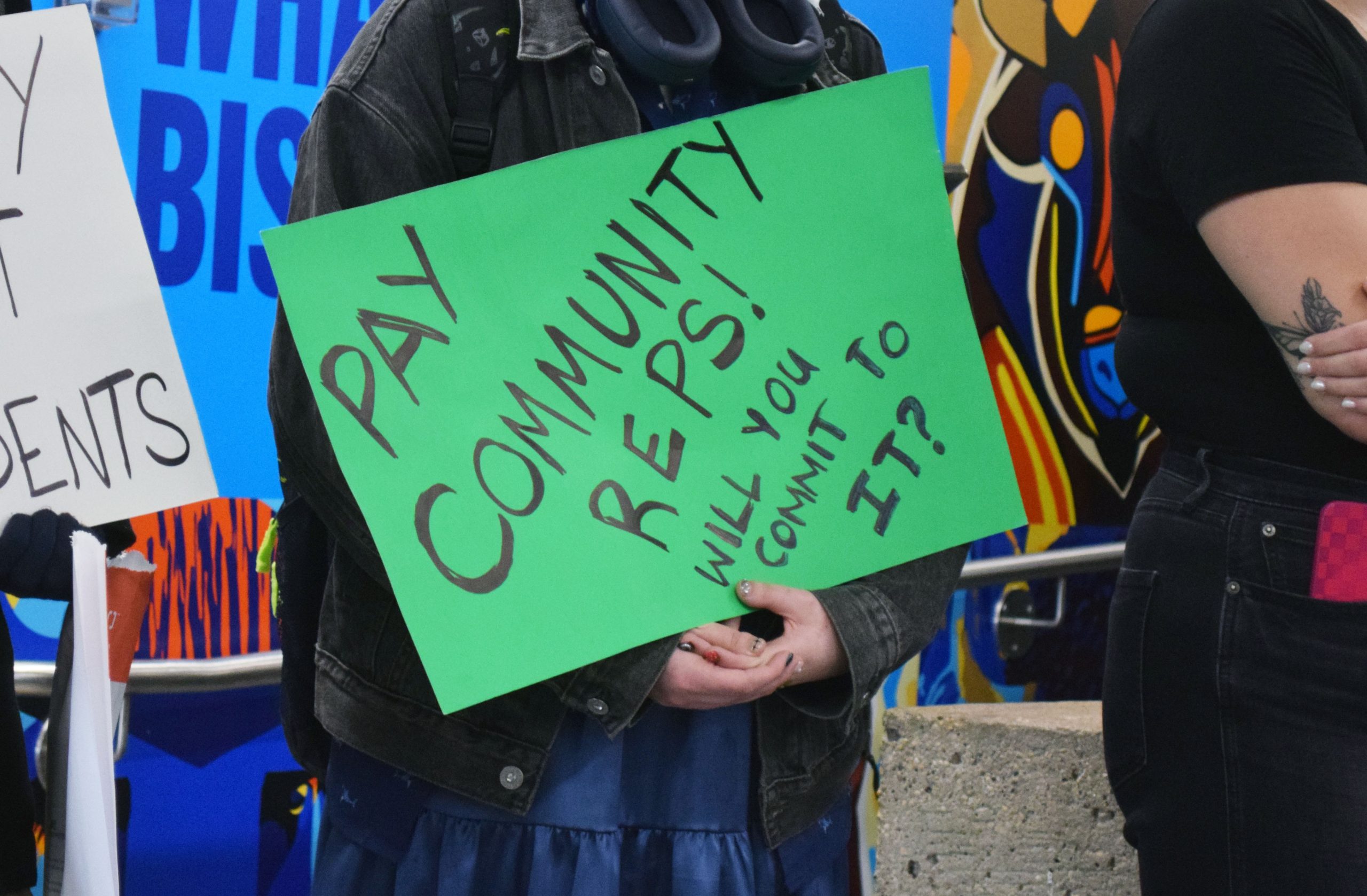
A student held a sign at the Feb. 26 UMSU vice-president forum calling for candidates to commit to paying community representatives if elected. Photo by Milan Lukes
Singh, who is also the UMSU president-elect, stated that he is “not against community reps ever getting an honorarium,” but added that “there needs to be a lot of research which is done.
“First on how the honorariums would function, assessment using key performance indicators and looking at the work that other student unions have done with regards to paying honorariums or not.”
Sharma stated that she and Akindele discussed with community representatives at the start of the year the finance committee’s decision to not grant them honorariums.
“I believe we had a mutual understanding,” she said.
Sharma stated that UMSU will be looking into a study to implement a framework to measure key performance indicators next year.
The post Motion for UMSU community representative honoraria referred to finance committee appeared first on The Manitoban.
Pope Francis, head of the Catholic Church, dies at 88 21 Apr 8:16 PM (9 days ago)
Pope Francis, head of the Catholic Church for the past 12 years, has died at the age of 88 according to a statement from the Vatican.
“At 7:35 this morning, the Bishop of Rome, Francis, returned to the home of the Father. His entire life was dedicated to the service of the Lord and of his church,” stated Cardinal Kevin Farrell in a video statement.
Pope Francis died in his residence at the Domus Sanctae Marthae in Vatican City from a cerebral stroke that put him in a coma and led to irreversible heart failure, per a statement from the Vatican.
His last public appearance occurred on Easter Sunday during the Urbi et Orbi blessing at the Vatican’s Saint Peter’s Square — a special blessing given on important dates for the Catholic Church. After declaring “Buona Pasqua” to the crowd, translating to “Happy Easter,” Pope Francis called on Archbishop Diego Ravelli to read the message he had written.
Pope Francis was previously admitted to Rome’s Agostino Gemelli Hospital on Feb. 14 for treatment of bronchitis, before developing pneumonia in both his lungs. On Feb. 22, the Vatican described his condition as critical and stated that he needed supplemental oxygen and blood transfusions.
Following a five-week stay, he was discharged from the hospital on March 23.
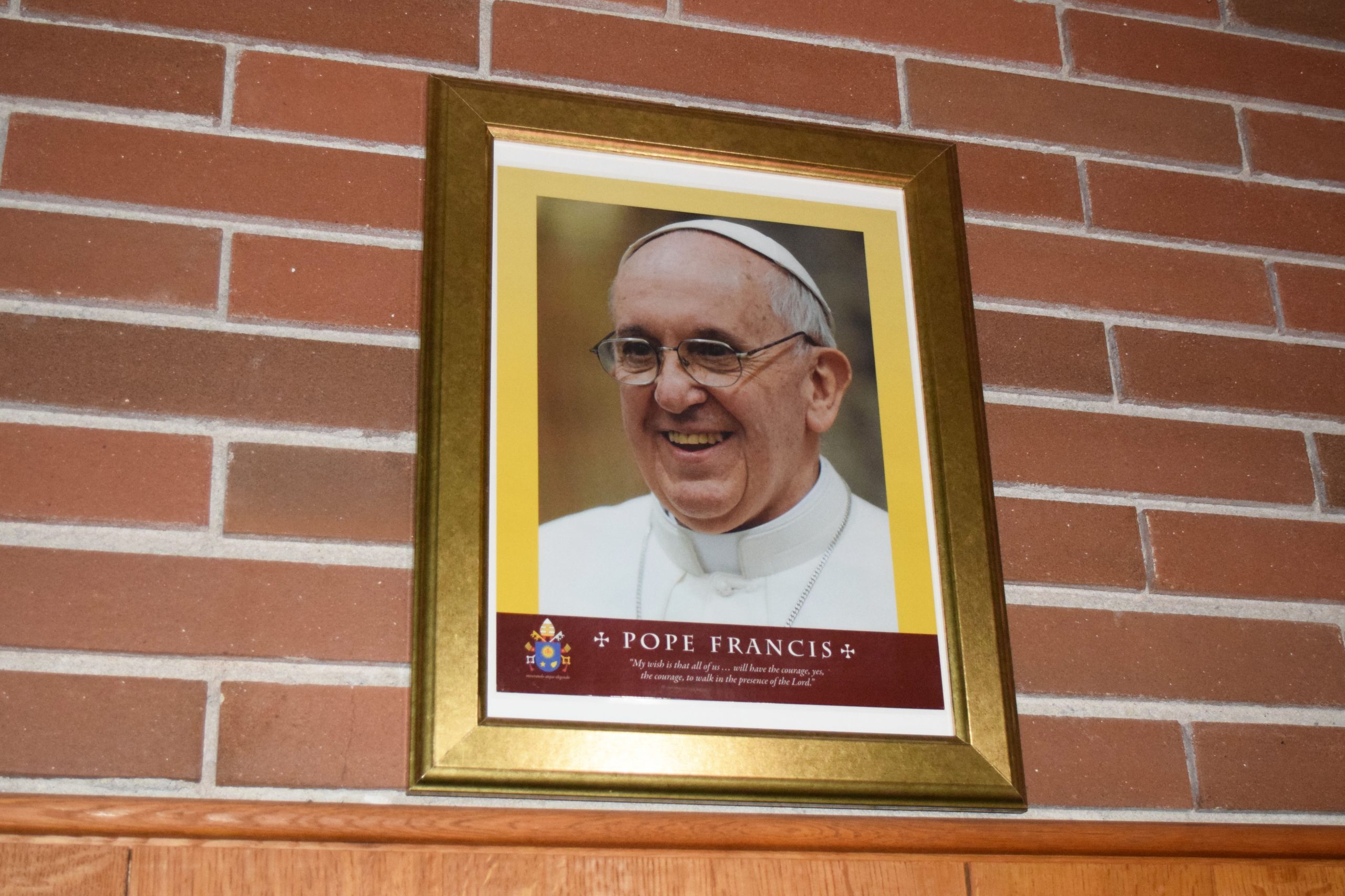
An image of Pope Francis hangs from within Christ the King Chapel at St. Paul’s College on campus. Photo by Milan Lukes
Pope Francis, born Jorge Mario Bergoglio in 1936, was the first pope from the Americas and from the Jesuit Order — a religious order of men in the Catholic Church.
He was appointed a cardinal in 2001 and was elected as the 266th pope on March 13, 2013 after the resignation of Pope Benedict XVI — the first pope to step down since 1415, according to the BBC.
In July 2022, Pope Francis visited Canada and gave a formal apology for the Catholic Church’s role in the Residential school system.
“I am here because the first step of my penitential pilgrimage among you is that of again asking forgiveness, of telling you once more that I am deeply sorry,” stated Pope Francis at a visit in Maskwacis, Alta.
“Sorry for the ways in which, regrettably, many Christians supported the colonizing mentality of the powers that oppressed the Indigenous peoples.”
Flag at St. Paul’s College lowered for the coming week
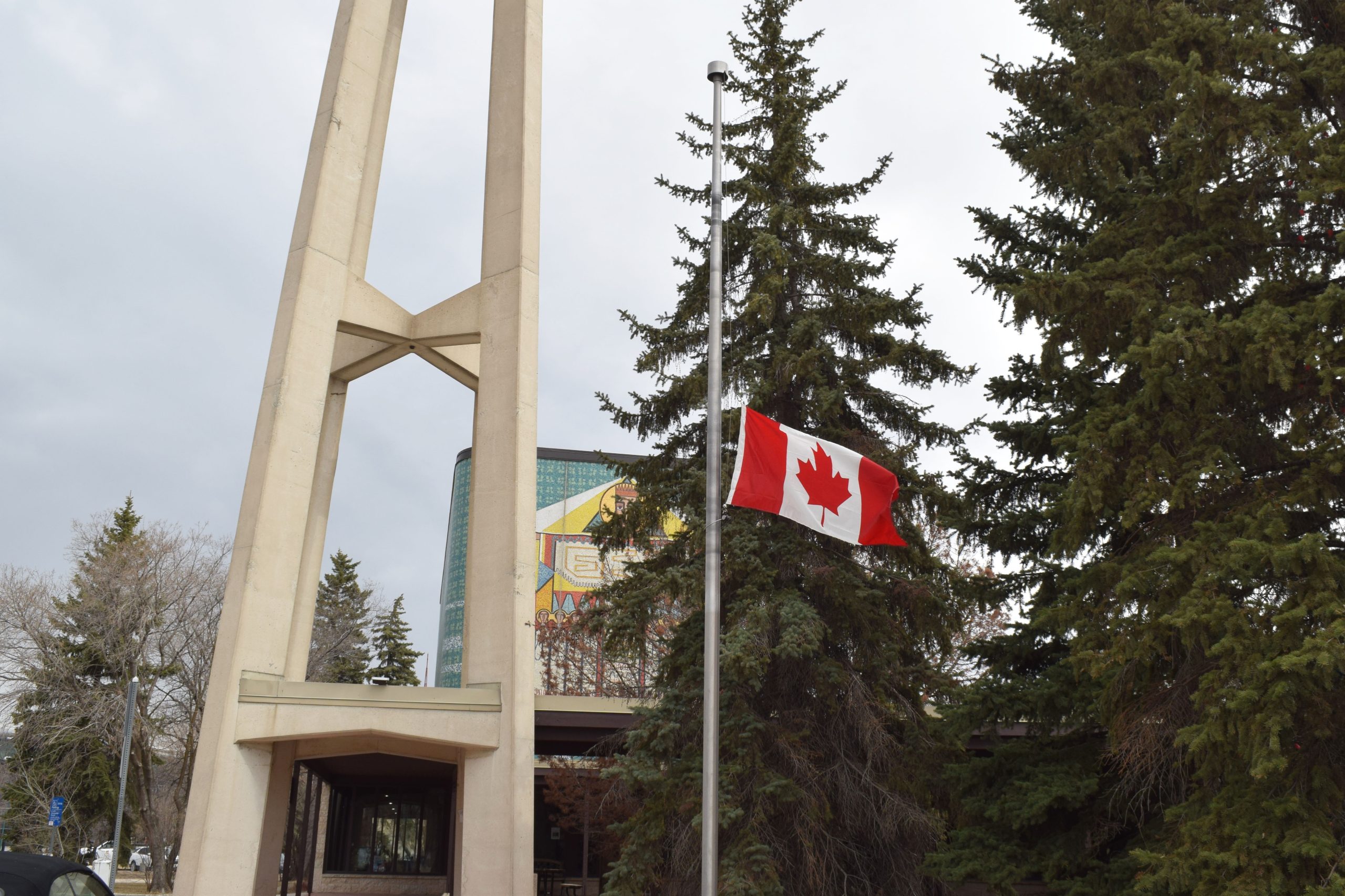
The Canada flag outside of St. Paul’s College was seen flying at half-mast on Monday. Photo by Milan Lukes
The Canadian flag outside of St. Paul’s College was lowered at half-mast this morning and will be lowered for the coming week, according to a social media post by St. Paul’s College.
“Both locally and globally, Pope Francis quickly became close to the heart of many Catholics and those of other Christian denominations and faiths,” read the post written by Cristopher Adams, rector of St. Paul’s College.
“We are all better people for learning about unconditional love and mercy from Pope Francis,” stated Adams.
A notice of the passing of Pope Francis was displayed outside of the entrance to the Christ the King Chapel at St. Paul’s College on Monday.
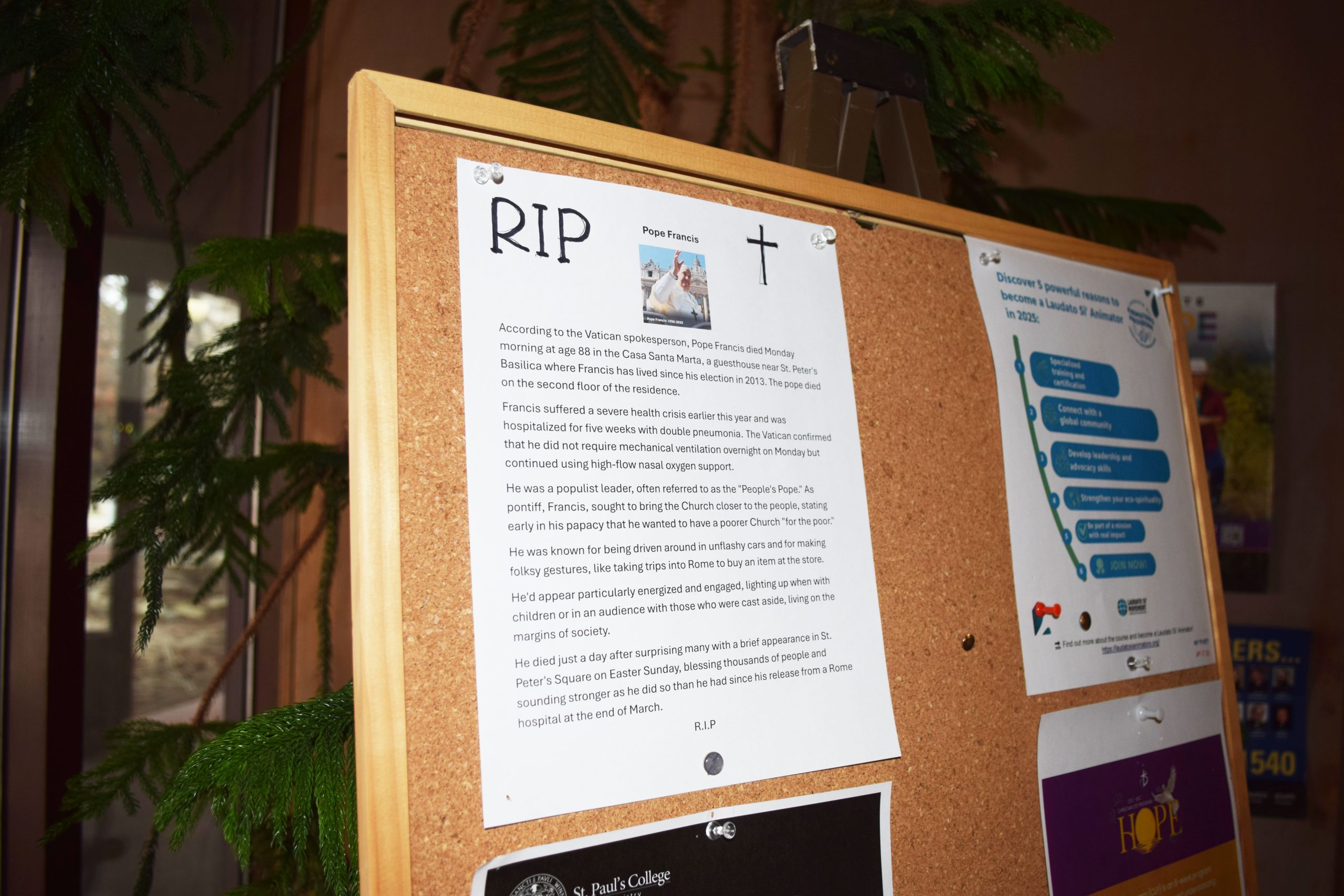
A notice of Pope Francis’ passing was displayed in St. Paul’s College on Monday. Photo by Milan Lukes
Pope Francis’ testament, which was released by the Vatican and dated June 29, 2022, states that he wishes to be buried in the Papal Basilica of Saint Mary Major in Rome.
“The tomb should be in the ground; simple, without particular ornamentation, bearing only the inscription: Franciscus,” reads the publicized English translation.
The global Catholic population was reported at over 1.4 billion in 2023, according to the Vatican’s Central Office of Church Statistics.
The post Pope Francis, head of the Catholic Church, dies at 88 appeared first on The Manitoban.
UMSU judicial board forgoes year-end oversight report 20 Apr 5:22 PM (11 days ago)
The University of Manitoba Students’ Union (UMSU) board of directors has waived the requirement for the judicial board to present the year-end Executive Oversight Report.
The judicial board is mandated to present the report semi-annually to the board of directors which is to include “an outline of the general performance” of each member of the UMSU executive, according to the UMSU Governance and Operations Manual.
Motion 0658, which was moved by the judicial board and carried at the April 10 UMSU board meeting, states that the judicial board has begun the process of completing evaluations, “but deems the current timeline to be unconducive to conduct evaluations thoroughly and methodically.”
The motion also states that a year-end report cannot be produced “due to several internal and external factors” such as “low procedural quality, judicial board workload and external commitments of members.”
The oversight report was to also include any specific recommendations for each executive member, as well as the number of complaints received regarding executive members and the outcomes of each complaint.
An amendment by Gurpahul Kaur, vice-chair of the judicial board, was carried which allows for an unofficial verbal report to be provided instead at the judicial board’s discretion.
“This would mean that […] in closed session, we can just give a brief of what we got,” said Kaur.
The first Executive Oversight Report, which was to be presented to the UMSU board of directors by Nov. 1, 2024, was previously granted two separate extensions — before being presented on Jan. 16.
The year-end report was to be presented by April 1 and cover the period spanning back to May 1, 2024, when the 2024-25 UMSU executives officially took office.
All UMSU Executive Oversight Reports are to be provided in closed session, per the UMSU Governance and Operations Manual.
The motion waiving the requirement of the year-end report passed unanimously in a secret ballot vote.
The post UMSU judicial board forgoes year-end oversight report appeared first on The Manitoban.
UMSU executives mandated to take accessibility training 20 Apr 2:46 PM (11 days ago)
University of Manitoba Students’ Union (UMSU) executives are now mandated to complete to certified accessibility training, following the passing of Motion 0656 at the April 10 UMSU board of directors meeting.
The motion states that the 2024-25 executive members must “engage in and complete a certified accessibility training session” before the end of their terms on April 30, 2025.
All future UMSU executives are also required to complete accessibility training before the start of their terms, including the incoming 2025-26 executive members before May 1, 2025.
The motion was put forward by the judicial board and was one of the recommendations following the March 27 verdict against vice-president student life Bolu Akindele.
Akindele was ruled to have violated two sections of UMSU’s governing documents, including a clause which states that the vice-president student life must serve as the liaison between UMSU and UMSU’s community representatives.
UMSU has seven community representatives, including an accessibility representative, though the Manitoban has not confirmed whether the certified accessibility training recommendation was directly related to a violation against the accessibility representative.
The Manitoban previously contacted Ekamjit Singh, UMSU’s accessibility representative, for comment but did not receive a response by the publication deadline.
Gurpahul Kaur, vice-chair of the judicial board, stated that the discretion will be left to UMSU staff to decide which accessibility training will be sufficient for UMSU executives.
The board of directors agreed through general consent that UMSU is obligated to pay the costs associated with the certified training.
Motion with additional recommendations postponed indefinitely
Another motion put forward at the same meeting which included additional judicial board recommendations following the verdict against Akindele was postponed indefinitely.
Motion 0657 sought to have the membership services committee (MSC) guidelines added to the UMSU Governance and Operations Manual along with several revisions by April 30.
UMSU president Divya Sharma spoke against the motion, stating that it “is likely unable to happen” due to governance committee not being able to meet quorum.
Sharma added that there are also “several contradictory things in our current governing documents” and stated that a motion will be brought forward at the April 24 board meeting calling for a “full overhaul” of all the governing documents.
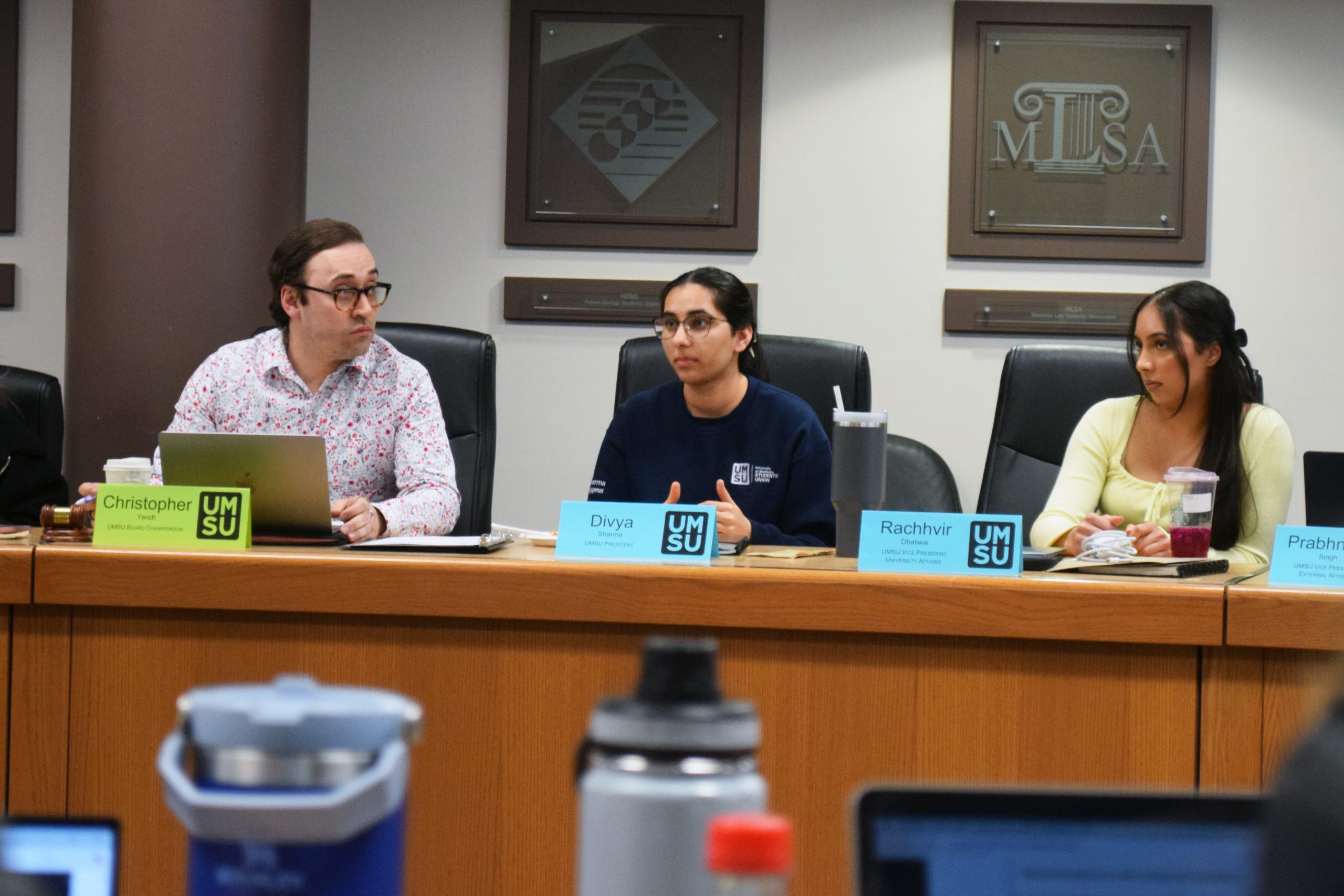
UMSU president Divya Sharma (centre) spoke in opposition of the motion, stating that a motion will be brought forward at the next UMSU board of directors meeting calling for a “full overhaul” of the governing documents. Photo by Milan Lukes
Acting UMSU board chairperson Christopher Yendt suggested that the motion could be postponed indefinitely and that the executive committee can “prepare a motion that is inclusive of the spirit of this.”
A motion to postpone the motion with recommendations indefinitely was moved by Andrew Beck, Interdisciplinary Health Program Students’ Association representative and carried by the board.
“It’s very important that the next MSC starts with solid documents to work with,” stated Kaur.
The post UMSU executives mandated to take accessibility training appeared first on The Manitoban.
Motion to declare judicial board ruling ‘flawed’ fails 19 Apr 8:38 PM (11 days ago)
A motion to declare a ruling by the University of Manitoba Students’ Union (UMSU) judicial board as “procedurally flawed” at the April 10 UMSU board of directors meeting has failed in a 13-6 vote.
Failed Motion 0659 described the March 27 ruling against UMSU vice-president student life Bolu Akindele as “[lacking] transparency, consistency and fairness” in the verdict process and states that it “did not meet the standards of due process expected in UMSU’s governing practices.”
It also states that the ruling “relied on documents and procedures that do not fall within UMSU’s official governing documents,” but did not specify details on the allegedly non-permissible procedures and documents.
The executive committee, of which Akindele is a member, submitted the motion.
The motion called for the judicial board’s recommendations following the verdict to be “unenforceable” and sought to have the governance committee review the mandates of the judicial board and membership services committee for alignment with UMSU’s governing documents.
Akindele was previously ruled to have violated a clause in the UMSU Governance and Operations Manual which calls for the vice-president student life to serve as a liaison between UMSU and UMSU’s community representatives.
She was also deemed to have violated the intent of the community initiative funding approval structure within the Membership Services Committee Criteria and Regulations. The judicial board was unable to comment further on the violations.
Course of action ‘shameful’, says former judicial board chair
Jared Ramos Murphy, former judicial board chair during the academic year and vice-president external affairs-elect, was one of the students that spoke in opposition of the motion.
“No executive has the power to appeal their decision, nor force the board,” stated Ramos Murphy. “The judicial board is the overseeing body of this union.”
“If this motion passes and it is upheld, the judicial board can be coerced by executives who are unhappy with the board’s rulings, then our union’s very future is at stake,” he added.
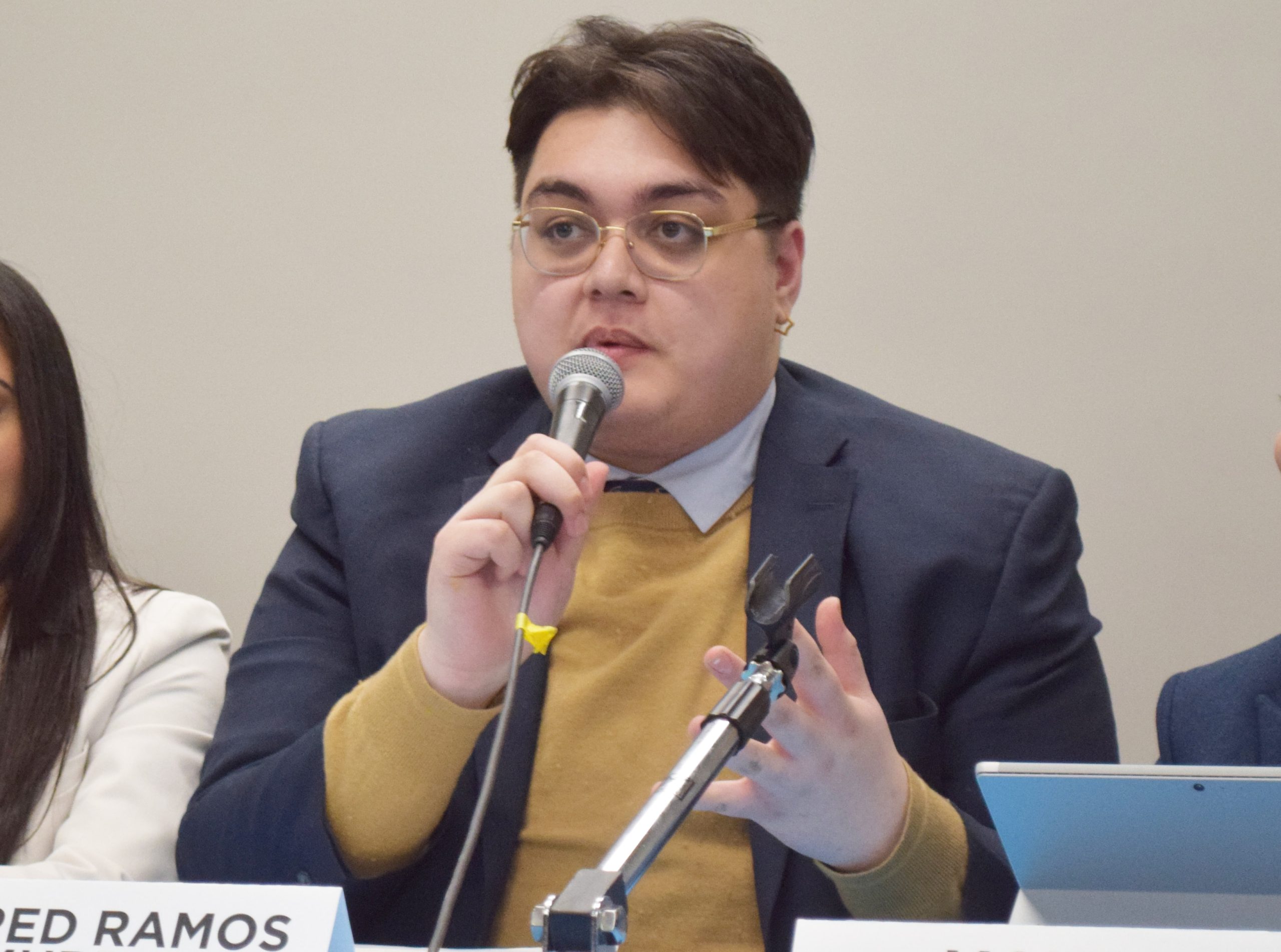
Former judicial board chair Jared Ramos Murphy, seen in a file photo from February, stated that no executive has the power to appeal the judicial board’s decision. Ramos Murphy resigned as chair of the judicial board on Jan. 20 and successfully contested the position of vice-president external affairs in the March UMSU general election. Photo by Milan Lukes
Ramos Murphy described the executive committee’s course of action as “shameful,” stating that the “judicial board is the only measure of protection for students-at-large to turn to, and any weakening of those protections should be unquestionably [refuted].”
Student-at-large Victoria Romero also spoke in opposition, stating that this motion could set a dangerous precedent.
“If this motion is to pass, there is no way that any executive could ever be held accountable for negative actions in the future,” she claimed. “They would always be able to say, ‘the judicial board didn’t do it the right way, the judicial board wasn’t fair.’”
Subcommittees must follow governing documents, says Akindele

Vice-president student life Bolu Akindele (left), seen in a file photo from February, was deemed at the March 27 UMSU board meeting to have violated two sections of UMSU’s governing documents. Photo by Zulkifl Rafah
“When subcommittees are not following the governing document, at the end of the day, this needs to be brought back to the board and the board has to put measures in place to make sure this doesn’t happen to anyone else,” said Akindele.
“Like the motion states, there are procedures that were not followed, there were violations to our governing documents based on the process of judicial,” she said.
“It will be a dangerous precedent if the board of directors cannot even address that.”
Akindele acknowledged the independence of subcommittees, but added that the board of directors is the highest authority of UMSU and has jurisdiction over every subcommittee.
A portion of the discussion occurred in closed session before the motion was defeated by secret ballot.
The post Motion to declare judicial board ruling ‘flawed’ fails appeared first on The Manitoban.